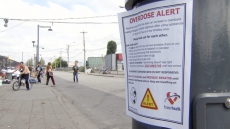VANCOUVER — John Nuttall hangs his head and promises he'll do better next time.
Covert video played in British Columbia Supreme Court from the spring of 2013 shows the man Nuttall calls his Muslim brother berating him for pitching a poorly researched terrorism plot to hijack a commuter train on Vancouver Island.
The problem: passenger service on the Via Rail line had been discontinued years earlier.
The video is part of the evidence heard by Justice Catherine Bruce, who is due to decide Friday whether the Mounties induced Nuttall and Amanda Korody, his common-law wife, to commit terrorist acts.
Nuttall's plans for the train were caught on police surveillance video.
"It was just an idea I came up with off the top my head ... as I was sitting in the truck," Nuttall explains, averting his eyes. The methadone-dependent former drug addict, who lived on welfare with Korody in a Vancouver-area basement suite, typed up the plan several days before at the brother's insistence.
"This thing has to be prepared. It has to be researched," says the police officer posing as an Arab businessman and Muslim extremist.
Nuttall becomes more animated as he promises to do better, offering more ideas on top of others he had proposed, including hijacking a nuclear submarine, breaking Omar Khadr out of prison in Guantanamo Bay, and storming a Vancouver Island military base using AK47s and "Teflon-coated" bullets.

"I'm here to make what you have in your head become true, what you want in your heart to be reality," says the undercover RCMP officer, who is part of an elaborate sting operation.
On Canada Day of 2013, Nuttall and Korody were arrested and charged with multiple terrorism-related offences after planting what they believed were pressure-cooker bombs on the B.C. legislature grounds in an effort to kill as many people as possible.
A jury found the pair guilty, but their conviction wasn't recorded while lawyers argued whether police manipulated the couple into committing the crime. If Bruce rules they were not entrapped, then the pair's guilt will be registered and a date will be set for their sentencing hearing. If she decides they were entrapped, a stay of proceedings will be issued and Nuttall and Korody walk free.
The case sets two competing versions of the same story against one another.
In the narrative presented by defence lawyers, the RCMP acted on unreasonable suspicions to exploit two vulnerable people, herding them towards a manufactured crime that was planned, prepared and all but carried out by the police.

Nuttall's lawyers said substance abuse and mental health played a role and that was highlighted in one video clip played at the trial where Nuttall encourages Korody to wilfully forget the name of their new friend — the undercover officer — so as not to endanger him should they be captured and tortured for information.
The Crown argues that the Mounties acted on reports about a man openly espousing views and plans to commit violent jihad, or holy war. They say police went undercover to gauge Nuttall's seriousness, before gently guiding him towards one of the many plans he had proposed but which would pose the lowest threat to the public.
Crown counsel insisted undercover officers offered Nuttall and Korody numerous opportunities to abandon their plans.
In a telephone interview, Crown attorney Peter Eccles acknowledged Bruce faces a difficult decision that pits public safety against the acceptability of police tactics.
"The tension is between society's expectation that we are going to be kept safe from (lone-wolf terrorists), and the reality that doing so, taking the investigative steps to ensure these individuals don't act on their fantasies of violence and visions of hate and murder, is problematic," he said.
"Restrictions on the police's ability to investigate these things are necessary to some extent. But we also don't want to gut their ability to deal with (the threat)."
Lawyer Marilyn Sandford, who represents Nuttall, said a finding of entrapment in such a serious case would be highly unusual, but it could have repercussions for how police conduct undercover operations.
If the arguments from Nuttall and Korody's lawyers hold sway, this will be the first terrorism case to end in entrapment in North America, said Kent Roach, a University of Toronto law professor and anti-terrorism expert.
FACTS ABOUT ENTRAPMENT IN RELATION TO A B.C. TERRORISM TRIAL
VANCOUVER — A ruling is expected Friday into whether a British Columbia couple found guilty of plotting to blow up the provincial legislature on Canada Day three years ago were manipulated by police. Lawyers for John Nuttall and Amanda Korody have argued their clients were entrapped by the RCMP into committing the terrorist acts. Here are some facts about entrapment:

What is entrapment?
The Supreme Court of Canada says entrapment occurs when authorities coax someone to carry out a criminal offence they would otherwise have been unlikely to commit. It can happen in one of two ways. Firstly, entrapment occurs if police provide an opportunity for someone to break the law without having reasonable grounds that this person is already engaged in or likely to engage in criminal activity. Secondly, entrapment happens if police go beyond providing an opportunity for a suspect to commit a crime and actually induce them to break the law. In Canada, entrapment is an argument against criminal liability.
How does entrapment work?
Unlike in the United States, entrapment arguments in Canada are heard and ruled on by a judge only after an accused has been found guilty, whether by jury or by judge alone. This is because entrapment is seen to be an abuse of process not against the accused but against the reputation of the entire legal system. In the U.S., a jury will decide on entrapment as part of its verdict, whereas in Canada entrapment arguments are heard following the jury verdict.

What needs to be proven?
There are two ways defence can prove entrapment. The first is by showing that law enforcement agents targeted someone randomly, without any reasonable suspicion. The second is making the case that, despite having reasonable grounds for suspicion, police went a step further and induced someone to commit an offence.
How often is entrapment argued?
Entrapment is rarely heard in court, even less so in relation to a terrorism trial. There have been only three instances in Canada where entrapment was argued in a terrorism case. None was successful. Two involved people connected to the Toronto 18 case, where police arrest 18 people accused of plotting attacks around southern Ontario in 2006. The third was in the case of Mohamed Hersi, who was sentenced to 10 years in prison after being convicted of attempting to join a terrorist group.
What are the results of an entrapment ruling?
If a judge rules that entrapment took place, a stay of proceedings is entered, which in this case means a permanent halt to the court proceedings. Although different than an acquittal, also known as a finding of not guilty, it has the same end result of allowing the accused to walk free without a criminal record. However, if a judge rules that a person wasn't entrapped, they will then register the conviction before moving on to sentencing.




